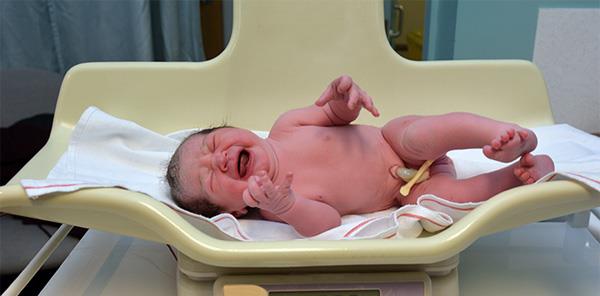Experts will conclude that infant weight is below standard when the baby is born with a weight of less than 2.5 kg. Being underweight at birth can be an indicator of a health problem your baby is having
content
Risks of subprime infant weights
Causes of below-standard infant weight
Prevent the phenomenon of low birth weight babies
Overcoming low birth weight in babies
Risks of subprime infant weights
The birth weight of a term newborn usually ranges from 2.8 to 4 kg. Newborns weighing less than 2.5 kg are usually either premature or have limited growth in the uterus. However, not all low birth weight babies will experience health problems. Some babies are born with a low weight and a smaller physique than most babies but still perfectly healthy.
In many cases, a below-standard infant weight at the time of birth can signal your baby is susceptible to complications such as mental retardation, vision loss or / and slow learning. Your baby is also more likely to experience the following problems:
Infection
Concentrated blood (polycythemia vera)
Respiratory paralysis
Problems with the immune system
Problems with lung function
Whether or not these problems are severe depends on how underweight and what health problems are causing them or when the intrauterine growth restriction occurs.

Newborn weight is a reliable indicator of a baby's health and predictions of possible problems in the future.
Causes of below-standard infant weight
In fact, the reason that low birth weight babies are born is more important than the condition itself. Babies can be underweight for the following reasons:
1. Preterm birth : If your baby is born before 37 weeks, the baby will more likely be underweight.
2. Twins or multiple pregnancies: If you have twins or more than 2 babies, babies will also be born with less weight than normal pregnancies. This is because many fetuses are developing at the same time, causing the uterus to reach its limit. At the same time, the source of nutrition for the baby is also limited, so the babies have to "compete" with each other to take advantage of this source of nutrition. In cases where a mother is only pregnant, the whole source of nutrition focuses on the baby.

12 common complications in twins pregnant mothers Understanding the possible complications of pregnancy will help mothers to have appropriate prevention and management plans. Especially, with twins, the risk of complications is also much higher
3. Restricting growth in the uterus: Babies are born at full term but still smaller than normal for gestational age. There are two types of growth restriction: asymmetrical and asymmetric.
The asymmetric form of growth restriction usually occurs from the 20th week of pregnancy by the mother with high blood pressure or from malnutrition. Babies born in this situation often have very thin bodies because the essential nutrients are prioritized by the body to develop the brain and heart. Your baby also has an abnormal size liver.
Symmetrical growth restriction can occur due to a chromosomal abnormality, infection of the fetus or the mother abusing alcohol and often being exposed to toxic substances. Babies with this growth retardation will have poor weight and length throughout pregnancy and often experience health problems after birth.
4. Placenta abnormalities: Abnormal problems affecting the equal amount of blood and nutrition passing through the placenta, pre-eclampsia can negatively affect the baby's development.

Placenta abnormalities to note The placenta is formed right after ovulation, is a place providing oxygen and nutrients to the baby. Therefore, it is very important to keep an eye on the placenta for possible strange signs. Abnormal placenta will easily cause miscarriage, even increase the risk of death for both mother and baby.
5. Uterine problems: In some cases, a problem in the uterus such as uterus with fibroids can also affect fetal development, leading to lower birth weight standard.
6. Some other issues:
The cervix is abnormal
The mother has a chronic health problem
The mother is slow to gain weight or gain weight at an abnormally slow rate during pregnancy
Pregnant at the age of under 17
The mother does not provide enough nutrients
Prevent the phenomenon of low birth weight babies
To detect any abnormality in the development of the fetus, pregnant mothers need regular prenatal check-ups, on schedule. Not only helps mothers recognize the slow growth phenomenon of the fetus, doctors also continue to monitor and discover the causes of this condition. Problems such as infection, abnormal placenta, high blood pressure ... will be controlled to ensure the fetus develops normally.
Adequate folic acid supplementation during pregnancy is also a good way to limit neural tube defects as well as low birth weight.
Overcoming low birth weight in babies
The best thing you can do to help your baby overcome being underweight and get the health you expect is to provide your baby with a nutritious diet. Breast milk is the perfect source of nutrition for babies from birth to 6 months of age.
For low birth weight babies, regular check-ups are also important. Let infant specialists assist you in your baby's first steps of development.
Also, the parents themselves need to be patient when dealing with this situation. It can take weeks and months to take your baby out of the light weight and associated problems.














